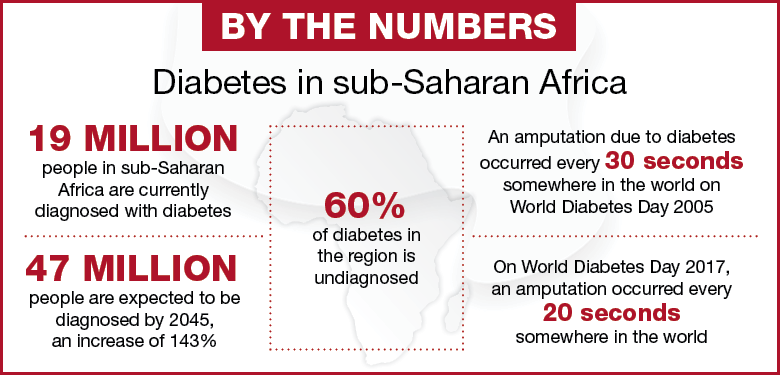
More than 19 million people in sub-Saharan Africa are currently diagnosed with diabetes, with another 27 million expected to be diagnosed by 2045, according to the International Diabetes Federation. That’s an increase of nearly 143% in the next 25 years.
These stark numbers are cause for immediate action, said the experts who presented Diabetes in Sub-Saharan Africa—Challenges and Opportunities during the Scientific Sessions. The presentation can be viewed by registered meeting attendees at ADA2020.org through September 10, 2020. If you haven’t registered for the Virtual 80th Scientific Sessions, register today to access all of the valuable meeting content.
Jean Claude Mbanya, MD, PhD, MRCP(U.K.), FRCP(London), FTWAS, Professor of Medicine and Endocrinology and Postgraduate Dean of the Doctoral School of Life, Health and Environmental Sciences at the University of Yaoundé I in Cameroon, discussed the epidemiology of diabetes in Africa. He reviewed several non-modifiable and modifiable factors, including urbanization, physical inactivity, and nutritional transition. Obesity is a big factor, he said, noting that 54.9% of people in South Africa have a body mass index greater than 25, in part due to a shift to Westernized eating habits.

According to results from the International Diabetes Management Practices Study, only 8% of diabetes cases are controlled in Africa. Why? There are several reasons, Dr. Mbanya said, including health care system inadequacies.
“Our health care systems are not structured for chronic diseases, they are structured for infectious diseases,” he said. “The cost of medication is too high and patients have to pay out of pocket, and therefore, it’s unaffordable. We also have poorly trained doctors. They are not well-trained to manage chronic diseases like diabetes. Lack of diabetes educators. Having a diabetes team is important if you really want to manage diabetes in any situation.”
One common diabetes complication is diabetic foot, a condition that is also underestimated and under-treated, said Zulfiqarali G. Abbas, MBBS, MMed, DTM&H, FRCP(Glasgow), FRCP(London), from the Department of Internal Medicine at Muhimbili University of Health and Allied Sciences in Tanzania.
In 2005 on World Diabetes Day, an amputation due to diabetes occurred every 30 seconds somewhere in the world. By 2017, the rate had increased to an amputation every 20 seconds. High amputation rates in Africa are caused by barefoot walking, inappropriate footwear, poor living conditions, lack of awareness, attempts at home treatment, tendency of the patient to first see faith healers or herbal doctors, and late presentation to health care centers, Dr. Abbas said.

“By the time the patient is finally referred to the hospital, it is often too late to save the foot or prevent death,” he said. “Time is tissue. Diabetic foot is an emergency in diabetes. It’s like a heart attack or myocardial infarction. It has to be treated as an emergency.”
Education is the most powerful tool for avoiding diabetic foot ulcers and amputation, Dr. Abbas said. An educational program in Tanzania, the Step by Step Foot Project, was successful in creating awareness of the problem and providing sustainable education and training for health-care professionals. Dr. Abbas said it’s a model for countries in the developing world.
“Efforts are required to increase awareness of diabetes and its complications amongst health workers and patients. Early detection and treatment of diabetes will improve course of disease and reduce morbidity and mortality,” he said.
Samuel Dagogo-Jack, MD, DSc, Professor of Medicine at the University of Tennessee Health Science Center, discussed the Pan African Diabetes Prevention Initiative (PDPI), which is adapting protocols from the Diabetes Prevention Program to local conditions. Each local PDPI team will select, recruit, train, and certify 10 or more lay persons to deliver lifestyle intervention protocols, he explained.

“There will be strength in building capacity across the continent,” Dr. Dagogo-Jack said. “Initially, trained leaders will train lay people, cascading outward, and expand the capability to execute. If this is properly executed and presented to our leaders, there is no doubt that being consistent with the Pan-African Union, WHO (World Health Organization), and the IDF (International Diabetes Federation) principles for Africa, we will be moving away from theory into action.”
Ayesha Motala, MB, ChB, MD, FRCP, FCP, from the University of KwaZulu-Natal, reported results from the Human Health and Heredity in Africa (H3Africa) Diabetes Study.
“This interim analysis has shown that in sub-Saharan African urban populations, there’s a high prevalence of type 2 diabetes as well as other cardiometabolic risk factors,” Dr. Motala said. “It shows that the diabetes epidemic is well established on this continent and dispels the previously held notion that it was rare. It is hoped that this multi-country study using a harmonized approach across diverse populations in Africa will provide a large-scale epidemiological and genomic resource that will increase the understanding of the molecular and pathophysiology basis of diabetes.”
The three primary goals of the H3Africa Initiative—a partnership between the National Institutes of Health, the Wellcome Trust, and the African Society of Human Genetics—include increasing the number of African scientists who are internationally competitive in genomics and population-based research, establishing collaborative networks of African investigators pursing genomics-based, disease-oriented projects, and creating and expanding infrastructure for genomics research, particularly bioinformatics and biorepositories, Dr. Motala said.
VIEW THIS PRESENTATION
Already registered?
View this presentation at ADA2020.org
Not yet registered?
Register now to access all presentations from the Virtual 80th Scientific Sessions
